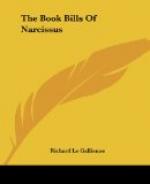It would even seem sometimes that he has an artistic rule over his ‘accidents,’ for ‘surprises’ have a wonderful knack of falling into the general plan of his life, as though but waited for. Our first meeting with him was a singular instance of this. I say ‘our,’ for Narcissus and I chanced to be walking a holiday together at the time. It fell on this wise. At Tewkesbury it was we had arrived, one dull September evening, just in time to escape a wetting from a grey drizzle then imminent; and in no very buoyant spirits we turned into The Swan Inn. A more dismal coffee-room for a dismal evening could hardly be—gloomy, vast, and thinly furnished. We entered sulkily, seeming the only occupants of the sepulchre. However, there was a small book on the table facing the door, sufficiently modern in appearance to catch one’s eye and arouse a faint ripple of interest. ‘A Canterbury,’ we cried. ’And a Whitman, more’s the wonder,’ cried Narcissus, who had snatched it up. ’Why, some one’s had the sense, too, to cut out the abominable portrait. I wonder whose it is. The owner must evidently have some right feeling.’
Then, before there was time for further exclamatory compliment of the unknown, we were half-startled by the turning round of an arm-chair at the far end of the room, and were aware of a manly voice of exquisite quality asking, ‘Do you know Whitman?’
And moving towards the speaker, we were for the first time face to face with the strong and gentle George Muncaster, who since stands in our little gallery of types as Whitman’s Camarado and Divine Husband made flesh. I wish, Reader, that I could make you see his face; but at best I have little faith in pen portraits. It is comparatively easy to write a graphic description of a face; but when it has been read, has the reader realised the face? I doubt it, and am inclined to believe that three different readers will carry away three different impressions even from a really brilliant portrait. Laborious realism may, at least, I think, be admitted as hopeless. The only chance is in a Meredithian lightning-flash, and those fly but from one or two bows. I wonder if an image will help at all here. Think on a pebbly stream, on a brisk, bright morning; dwell on the soft, shining lines of its flowing; and then recall the tonic influence, the sensation of grip, which the pebbles give it. Dip your hand into it again in fancy; realise how chaste it is, and then again think how bright and good it is. And if you realise these impressions as they come to me, you will have gained some idea of George Muncaster’s face—the essential spirit of it, I mean, ever so much more important than the mere features. Such, at least, seemed the meaning of his face even in the first moment of our intercourse that September dusk, and so it has never ceased to come upon us even until now.




